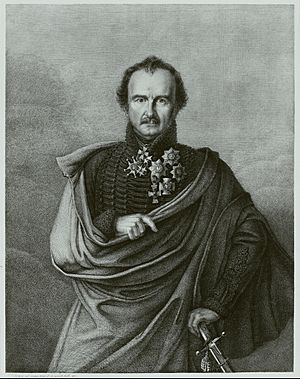Wilhelm von Dörnberg facts for kids
Quick facts for kids
Wilhelm Caspar Ferdinand von Dörnberg
|
|
|---|---|

Wilhelm von Dörnberg by Ludwig Emil Grimm
|
|
| Other name(s) | Sir William de Dornberg |
| Born | 14 April 1768 Schloss Hausen, Hesse-Kassel |
| Died | 19 March 1850 Münster, Prussia |
| Allegiance | Hesse-Kassel Prussia Westphalia Brunswick United Kingdom Hanover |
| Service/ |
Various armies |
| Years of service | 1783–1796 (Hesse-Kassel) 1796–1807 (Prussia) 1809 (Westphalia) 1809 (Brunswick) 1809–1816 (United Kingdom) 1816–1831 (Hanover) |
| Rank | Captain (Hessel-Kassel/Prussia) Colonel (Westphalia) Major-General (United Kingdom) Lieutenant-General (Hanover) |
| Commands held | Westphalian Guard Jaeger Battalion Black Legion cavalry Brunswick Oels Hussars Russian–German Legion 1st Cavalry Brigade (KGL) 3rd Cavalry Brigade 1st Hanoverian Cavalry Brigade |
| Battles/wars | |
| Awards | Waterloo Medal Hanseatic Medal for the Campaign of 1813–1814 Medal "For the Capture of Paris" |
| Spouse(s) | Julie von Münster-Meinhövel |
| Children | 8 |
| Relations | Johann Friedrich von und zu Mansbach (uncle) |
Wilhelm Caspar Ferdinand Freiherr von Dörnberg (born April 14, 1768, in Schloss Hausen; died March 19, 1850, in Münster) was a German general. He was also known as 'Uprising Dörnberg'. This nickname came from his role in the German campaign during the Napoleonic Wars. He also fought as a brigade leader at the Battle of Quatre Bras and the famous Battle of Waterloo.
Contents
Life of Wilhelm von Dörnberg
Family Background
Wilhelm von Dörnberg came from a noble family in Hesse. This family was part of the 'Ritterschaft', which means they were part of the old knightly class. Since 1732, his family held an important position in Hesse-Kassel. This position was called Erbküchenmeister.
Early Military Career
Dörnberg started his military journey in January 1783. He joined the First Guard Battalion of Hesse-Kassel. By January 22, 1785, he became a First Lieutenant. His first experience in war was in 1792. He fought against France in the Champagne Region. On December 6, 1792, he was promoted to Staff Captain.
Dörnberg's Uprising: A Bold Plan
Dörnberg became involved with groups who wanted to fight against French rule. These groups were active in Westphalia and Berlin. In December 1807, he joined the Westphalian Guard. He quickly moved up in rank and gained the trust of King Jerome. By February 1809, he was promoted to Royal Adjutant. He also became the commander of the Garde-Jäger.
The Uprising Begins
In the spring of 1809, war was about to start between France and Austria. The anti-French groups thought this was the perfect time to act. An earlier plan by Lieutenant Katte to capture Magdeburg failed quickly. But Dörnberg and his followers continued their own plans. They focused on Kassel, the capital of Westphalia.
The Rebels' Challenges
On April 22, 1809, different groups began to move. Their goal was to capture King Jerome and secure the capital. However, they struggled with coordination. Also, their groups lacked strict military discipline. This made their plan difficult.
The Uprising Fails
By the morning of April 23, French and Westphalian forces moved against the rebels. A small but organized force quickly scattered the rebels. This happened at a small village called Knallhütte. Dörnberg himself fled south. He disguised himself as a civilian and eventually reached Bohemia.
Another group of rebels faced a similar defeat. They were met by French forces at Wolfhagen. A final group of about 4,000 rebels was approaching Kassel from the northwest. When they heard that Dörnberg was defeated and had disappeared, they also began to scatter. By the evening of April 23, the uprising had completely collapsed. Its leaders had either fled or were captured.
Later Military Service
Before the Battle of Waterloo, Dörnberg was involved in an incident. He held back a British scout. This scout was carrying important news about Napoleon's troop movements to Wellington. Because of this delay, Wellington could not gather his forces in time. This meant he could not support Blucher at the Battle of Ligny. Some believed this delay contributed to the loss at Ligny.
 | Kyle Baker |
 | Joseph Yoakum |
 | Laura Wheeler Waring |
 | Henry Ossawa Tanner |

